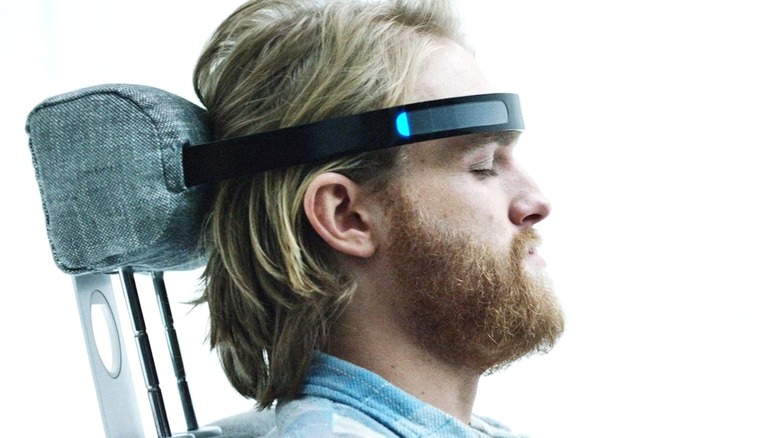What The Title 'Black Mirror' Really Means, According To The Show's Creator
A quick inspection of the major inspiration behind "Black Mirror" leads us to a critically acclaimed CBS anthology series that serves as the blueprint for speculative fiction on television. Yes, Charlie Brooker's "Black Mirror" generously borrows from Rod Serling's "The Twilight Zone," where any similarities between the two stem from Brooker playing homage to the beloved CBS show. Even when these callbacks are not deliberate, the influence of "The Twilight Zone" is impossible to escape, as the series has shaped our collective understanding of stories that evoke the real and the surreal.
Moreover, Serling's show has always held up a mirror to root-level societal issues, with every episode playing out as a morality tale that condemns the hollowness of an increasingly capitalist landscape. "Black Mirror" has consciously mimicked this approach from a postmodern lens, with an increased focus on our complicated relationship with technological progress. As a result, most "Black Mirror" episodes are prescient or dystopian, where the appeal lies in the gap between the present and what could potentially occur in the near future.
These possible futures, however, are mostly bleak, forcing us to confront our over-reliance on technology that might erode our sense of humanity. With the frightening advent of generative AI steadily replacing the onus to learn base-level human skills — from the most rudimentary critical thinking to research-based essay writing — the picture etched by "Black Mirror" is not as speculative as we would like it to be.
This raises the question: What does the term "Black Mirror" even mean? If we look at the show's inspirational roots, "The Twilight Zone" has been described as a liminal space that lies "between light and shadow" and "science and superstition." It is a purely imaginative dimension that is beyond space/time, reflecting mankind's greatest fears and the limits of human knowledge. Keeping this in mind, what does "Black Mirror" mean? Let's see what Brooker himself has to say.
Black Mirror represents the liminality of every technological screen in our lives
In an op-ed for The Guardian, Brooker spoke at length about the troubling trend of speaking to machines all day long — a fairly recent accepted reality that wouldn't have made sense only a decade ago. Brooker cites examples, including our newfound urge to constantly tweet about our lives, or the need to share videos of absolute strangers for viral interactions on social platforms. While underlining these constantly changing norms of what's considered socially acceptable, Brooker explains the liminality of the term "Black Mirror," which refers to every blank screen in our lives, from TVs to smartphones:
"This area – between delight and discomfort – is where 'Black Mirror', my new drama series, is set. The 'black mirror' of the title is the one you'll find on every wall, on every desk, in the palm of every hand: the cold, shiny screen of a TV, a monitor, a smartphone."
Brooker confirms "The Twilight Zone" connection right after, highlighting the brilliance of Serling's scripts, which could talk about issues like racism or class-based exploitation within "a metaphorical, quasi-fictional world" without fear of censorship. The CBS show's anthology format also allowed writers to explore a wide breadth of themes, increasing the scope of what Serling and co. wanted to say from an artistic standpoint. Brooker follows up by saying that "Black Mirror" has always aimed to do the same:
"That's what we're aiming for with 'Black Mirror': each episode has a different cast, a different setting, even a different reality. But they're all about the way we live now – and the way we might be living in 10 minutes' time if we're clumsy. And if there's one thing we know about mankind, it's this: we're usually clumsy."
It is worth noting that Brooker doesn't deny the usefulness of technology in the postmodern era; if anything, he has an appreciation for technological services that can make life a tiny bit easier. However, the impetus behind "Black Mirror" lies in the latent worry for our futures, where this reliance might reach alarming levels and end up negating the human experience as a whole.

